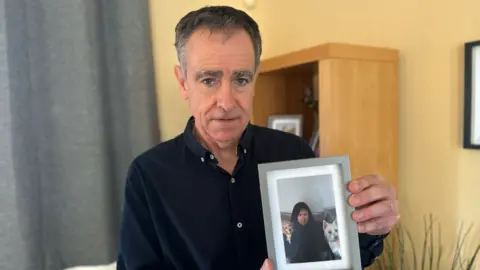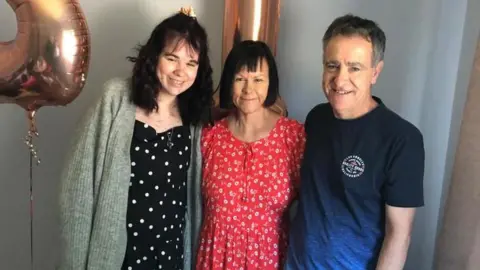Dad calls for tighter rules on poison purchases
 Josie Hannett/BBC
Josie Hannett/BBCThe father of a 22-year-old woman with autism and attention deficit hyperactivity disorder who took her own life after buying poison online is calling for tighter restrictions on their availability.
Hannah Aitken, 22, from Guildford in Surrey, bought the industrial strength chemical from Malaysia and had it shipped to the UK.
Her father, Pete Aitken, says the high-strength poison should be a regulated poison and only sold to those with a licence.
A government spokesperson said: "We will continue to engage with suppliers to ensure businesses are vigilant with the sale of this substance.”
The poisonous substance, which the BBC is not naming, can be bought by anyone over the internet with no restrictions.
It is not an illegal substance and is used for industrial purposes, but it is still classified as a reportable poison.
This means that sellers in the UK have a duty to report suspicious transactions to the Home Office and can ask buyers what they are purchasing the chemicals for.
Sellers from abroad do not need to do this, and buyers do not need a licence.
Mr Aitken said: "I had never heard of this poison at all.
"When we found out what it was, the first question we had was, how did she find out about it and how did she know about it?"
 Pete Aitken
Pete AitkenFollowing Hannah's inquest, Surrey assistant coroner Anna Loxton raised concerns over the lack of restrictions in place to stop people being able to buy the substance and import it from abroad with no checks.
Hannah had initially tried to buy the chemical from a company in Manchester but was sent a declaration-of-use form and she did not go ahead with the purchase.
She was able to buy about 1,000 times the lethal dose of the poison at 99% purity from a company in Malaysia, which she then used to take her own life.
The company says it no longer sells the chemical.
Ms Loxton raised concerns in her prevention of future deaths (PFD) report that the use of this poison for self harm had been increasing and she was aware the Home Office has received at least five PFDs relating to the same substance since 2020.
She also expressed concern that the quantities and purity in which it was sold "does not appear to be those required for their legitimate use".
- If you've been affected by the issues in this story, help and support is available via the BBC Action Line
Her father is now calling for better regulation of the substance and says he feels the Poisons Act 1972 is aimed more at tackling terrorism, rather than preventing suicides.
Mr Aitken said: "The purity for legitimate purposes is 1% so it seems to us that there is a practical step that could be made such that 1% purity stays as a reportable poison, but purities above this level could be made a regulated poison which would mean that you would need a licence to buy it.
"In this way, a safeguard could be provided for a lot of vulnerable people like Hannah, but at the same time allow people to use it legitimately."
'Seriously let down'
Mr Aitken said his daughter had been placed into seven different mental health hospitals over five years from the age of 15, and attempted suicide multiple times.
He says he feels Hannah was "seriously let down" by Surrey and Borders Partnership NHS Foundation Trust.
He said: "On numerous occasions we raised our concerns around the care and lack of expertise and experience in caring for Hannah with her complex autistic needs."
At the conclusion of the inquest, the coroner could not find an omission in Hannah’s mental health care had contributed to her death.
However, she did highlight missed opportunities relating to Hannah's care plan not being updated and not all staff being advised how best to engage with her.
Hannah was under a community treatment order when she died in assisted living accommodation in Surrey in September 2023.
Graham Wareham, chief executive of Surrey and Borders Partnership NHS Foundation Trust, said: “We are very sorry to hear about the concerns raised by Hannah Aitken’s family regarding her care, which we take very seriously.
"We are reaching out to the family to ask for the opportunity to discuss their concerns in more detail.
“While the assistant coroner and court-appointed expert did not find that the care provided by Surrey and Borders Partnership contributed to Hannah’s tragic death, we will continue to reflect on our role in Hannah’s care with a view to continuous improvement and learning.”
 Pete Aitken
Pete AitkenMr Aitken would like to see ambulance crews carry the poison antidote as standard and have the relevant training to be able to recognise the signs of an overdose.
It is currently not a requirement of ambulance services to do so, but there is an ongoing trial in the West Midlands.
The antidote is available in A&E.
Caleb Bawdon, an associate solicitor at law firm Leigh Day, said: "Coroners have clearly been trying their best to raise concerns about this issue but nothing has been done to effectively address this risk.
"The responsibility is now with the government to do something about it."
The home secretary and the health secretary are obliged to respond to the coroner within 56 days of the PFD being published, to provide details of action being taken or proposed action due to be taken to prevent future deaths.
A spokesperson for the Home Office said: “Our thoughts are with the families and friends of Hannah Aitken and any other individuals who have sadly lost their life due to this substance.
"Ministers are considering the coroner’s report carefully.
“The Poisons Act is meant to ensure that retailers report any attempted or suspicious transactions of poisons where the buyer may intend to cause harm to themselves or others."
Follow BBC Surrey on Facebook, and on X. Send your story ideas to [email protected], or WhatsApp us on 08081 002250.
